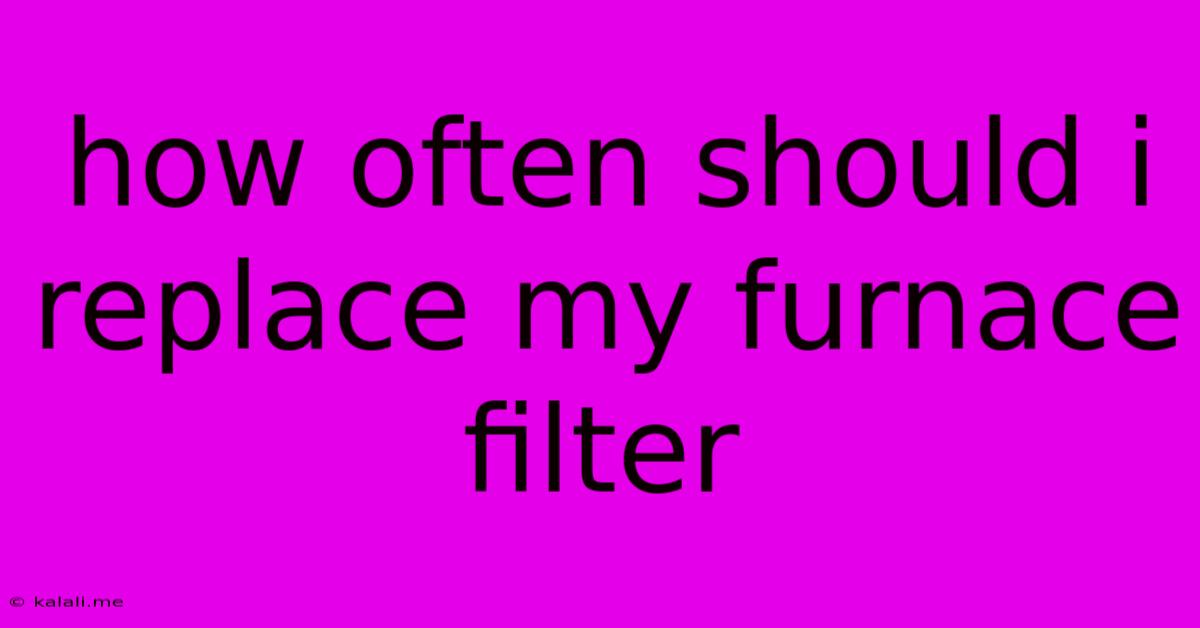How Often Should I Replace My Furnace Filter
Kalali
May 26, 2025 · 3 min read

Table of Contents
How Often Should I Replace My Furnace Filter? A Comprehensive Guide
Meta Description: Learn how often you should change your furnace filter to maximize efficiency, improve indoor air quality, and extend the life of your HVAC system. This guide provides a comprehensive breakdown based on filter type and lifestyle factors.
Replacing your furnace filter might seem like a small task, but it's crucial for maintaining a healthy home and a well-functioning HVAC system. A clogged filter restricts airflow, forcing your furnace to work harder, consuming more energy and potentially leading to costly repairs. But how often should you actually change it? The answer isn't a simple one-size-fits-all. Let's delve into the factors influencing filter replacement frequency.
Factors Determining Furnace Filter Replacement Frequency
Several key factors dictate how often you need to replace your furnace filter:
-
Filter Type: Different filter types have varying lifespans. Standard fiberglass filters are the cheapest but least effective, usually requiring monthly replacements. Pleated filters (both standard and high-efficiency particulate air (HEPA) filters) last longer, often lasting 3-6 months, depending on the air quality in your home. Electrostatic filters attract and hold dust particles, and can last even longer, but eventually need replacing.
-
Indoor Air Quality: Homes with pets, smokers, or people with allergies tend to accumulate more dust and allergens, necessitating more frequent filter changes. If you notice a significant increase in dust or pet dander, consider more frequent replacements. Think of it as an indicator of your filter's overall load.
-
Number of Occupants: A busier household generates more dust and debris, requiring more frequent filter changes. The more people living in the house, the more likely you'll need to change the filter more often.
-
HVAC System Size and Usage: Larger HVAC systems generally require less frequent filter changes than smaller systems, however, frequency of use will heavily influence this. If you use your system constantly (especially during harsh winters or summers), you'll need to change your filter more often. Essentially, the more your system works, the more it needs cleaning.
-
Household Activities: Renovations, cleaning projects, or other activities that kick up dust will require more frequent filter changes. Any home improvement or intense cleaning should prompt a post-activity filter check.
Recommended Replacement Schedules
While there's no magic number, here's a general guideline:
- Fiberglass filters: Replace monthly, or even more frequently if you have pets or allergies.
- Pleated filters: Replace every 3-6 months. Check them monthly and replace sooner if they appear visibly dirty.
- HEPA filters: These high-efficiency filters can last longer, sometimes up to a year, but should be inspected monthly and replaced when they appear clogged. These are exceptionally good at trapping allergens, but that also means they'll fill up quickly.
- Electrostatic filters: These can last longer than pleated filters, but still require regular inspection and replacement every 6-12 months, depending on the level of soiling.
How to Tell When to Replace Your Furnace Filter
Beyond the timeframe, there are several visual cues indicating it's time for a replacement:
- Visible dirt: A heavily soiled filter is a clear sign it needs changing. If you can see a significant buildup of dust, pet hair, or other debris, it’s time for a replacement.
- Restricted airflow: If you notice reduced airflow from your vents, a clogged filter is often the culprit. This can be accompanied by a decrease in heating or cooling efficiency.
- Increased energy bills: A clogged filter forces your furnace to work harder, potentially leading to higher energy bills. If you're noticing an unusual increase, check your filter.
The Bottom Line
Replacing your furnace filter regularly is an easy yet vital task for maintaining a healthy home and efficient HVAC system. By considering the factors outlined above and performing regular inspections, you can ensure optimal performance, improve indoor air quality, and extend the life of your furnace. Remember, a small investment in regular filter changes can save you money on energy bills and expensive repairs in the long run.
Latest Posts
Latest Posts
-
How To Get A Survey Of My Property
May 26, 2025
-
How Old Was Jesus When He Started His Ministry
May 26, 2025
-
Can You Be Trespassed From A Public Building
May 26, 2025
-
Set Component Visibility In Experience Site
May 26, 2025
-
Does 3 Of A Kind Beat 2 Pair
May 26, 2025
Related Post
Thank you for visiting our website which covers about How Often Should I Replace My Furnace Filter . We hope the information provided has been useful to you. Feel free to contact us if you have any questions or need further assistance. See you next time and don't miss to bookmark.